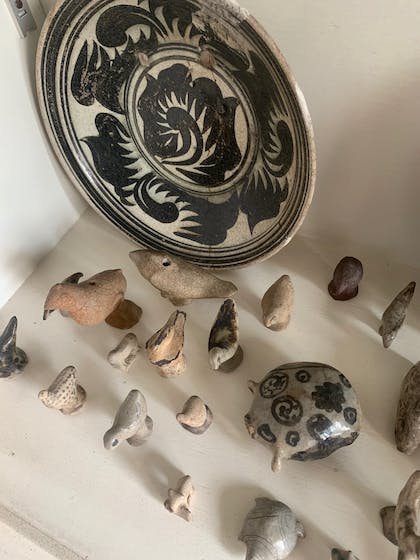
There’s something special happening deep in the countryside of Northern Thailand. Located about 30 minutes outside of Chiang Rai city, a small women-run business is giving back to the northern Thailand hill tribe community in a big way. The modest team of hill tribe women handmake, of all things, clay bird whistles. The products these women create in their tiny shop are putting the power of employment and skill back into their own hands.
eBannok Handicraft Project (‘e’ for ecommerce and ‘Bannok’ Thai for ‘countryside’.) began 22 years ago through Chiang Rai’s NGO (Non-Governmental Organisation) Mirror Foundation. The Mirror Foundation is a nonprofit whose aim is to give something back to the five hill tribes of Thailand’s northern region. The hill tribes include Lahu, Mien, Hmong, Akha and Karen.
“Mirror’s philosophy,” said Mirror staff member Nikki Dand, “is about not getting people to change who they are, but rather, to embrace their culture and not hide it and promote it.” Nikki keeps eBannok’s ducks in a row and has adopted the eBannok volunteer production manager position. She now oversees the staff, ordering and production at eBannok. She flew to Thailand in 2012 on a three week visit from England as a volunteer, fell in love with the country and eventually decided to stay.
Nikki explained the project’s mission fervidly, “Ebannok is a project that provides local people with employment that is safe and reliable. It gives them skills to feed their families. There’s one seamstress, three painters, a molder and an assistant manager. The goal is empowering the ladies. eBannok wants to empower the local ladies and community to have a worthwhile job. Whether they stay working for us or go somewhere else they will have a worthwhile skill for their future. The women here make a variety of things. They make terracotta clay whistles, earrings, clothing, handbags and paperweights which are made using mostly local materials.”

The moulder and painters get paid by piece while the assistant manager and seamstress are given a daily rate. Employees are trained and each item is handcrafted meticulously by the hill tribe workers. The clay for the whistles, for example, is ordered from a local clay provider then weighed out into smaller pieces for shaping. The women dry the clay forms for three months, fire them in a homemade kiln and then apply paint. The whistles are currently selling really well, “Yes, we sell quite a few of them,” said Nikki, “we work with a distributor in Australia that sells many of our products. We chose whistles because of their link with nature, birdwatching as well as the sound. They are small, colourful and unique.” A soft blow on the whistles provide a pleasing tweet.
eBannok’s small business success, however, isn’t about making the big bucks. The mission of the project is much deeper. Nikki explained, “It’s not about the money. It’s about ensuring that the girls have the skills to provide for their families. Hill tribe people aren’t classed as citizens in Thailand even if they are born in Thailand. If their mom doesn’t have Thai citizenship, you won’t be considered Thai. Having that label has a massive impact. They have Thai ID cards but they are treated differently. Previously, the Mirror Foundation had a Thai-citizen project. All of the women that work here didn’t have Thai citizenship and we have assisted them in getting that.”
As well as Thai citizenship, eBannok assists the women in staying healthy. Nikki said, “We care about all the workers and we want to ensure that the women don’t get overworked. We pay for the women to get a general yearly health checkup and eyesight check. This year’s eyesight tests revealed that they all needed glasses. eBannok paid for them all to get glasses.”
Along with many other small businesses in the world, eBannok struggled through COVID but persisted, “When the virus hit we weren’t able to ship outside of the country at all. We couldn’t do anything so the women focused on growing our stock and we just kept going.” eBannok’s small shop in Mae Yao is open from 9am to 5pm Mondays through Fridays.

43 year old Busue Mayer, one of eBannok’s moulders, shared a bit of her personal story, “I came to eBannok because I had a small child and I was unable to do work without childcare. I’ve liked sculpting since childhood. eBannok provides independence, childcare, is animal friendly, reliable and it is also local work. I also enjoy the flexibility. I can take time off for funerals, harvest, the doctor, etc.”
While eBannok’s shop is located a few hours north of Chiang Mai, you can support the women online by ordering on their website below. The proceeds for any purchase help the hill tribe women maintain consistent work and opportunity. Anyone up for a road trip can visit the shop for smiles, a family friendly environment and of course, lovely bird whistles.
eBannok website: http://www.ebannok.themirrorfoundation.org
eBannok Facebook: https://web.facebook.com/ebannokproject
Information on the fight for citizenship of many hill tribes https://www.chiangmaicitylife.com/clg/our-city/city-issues/the-importance-of-being-thai-giving-citizenship-where-citizenship-is-due/
www.willlangston.com


















